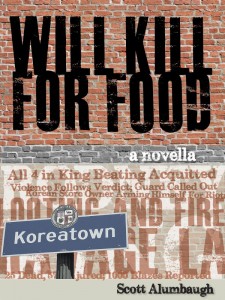 I recently read two books that seemingly have little to do with each other: Presumed Innocent by Scott Turow and Atticus by Ron Hansen. What struck me about these two books is that they both have what I am choosing to call a “convenient corpse.”
I recently read two books that seemingly have little to do with each other: Presumed Innocent by Scott Turow and Atticus by Ron Hansen. What struck me about these two books is that they both have what I am choosing to call a “convenient corpse.”
A convenient corpse is a body everybody can care about enough to drive the plot of the book, but not care about so much that the person’s death causes the protagonist and real moral concern. The person’s death drives some aspect of the story; but once that purpose is served, the body can go away and just leave everyone else alone. I find this concept really disturbing.
In Presumed Innocent, the body is Carolyn Polehemus, the protagonist’s mistress and obsession who turns up dead. She’s blond, sexy, gorgeous, and a great attorney to boot. It also turns out that she was manipulative, conniving, and apparently trying to sleep her way to the top. By the end of the story, we learn that even Carolyn’s college-age son doesn’t really care who killed her. And that allows our hero, Rusty Sabich, to think it’s okay not to turn in his wife for murdering Carolyn. You see, he couldn’t bear to separate his wife from their son. And it’s okay to let Carolyn’s murderer go unpunished because no one cares about Carolyn anyway. She was a slut. Or as Sabich’s pal Lipranzer says, she was bad news.
In Atticus, a father travels to Mexico to reclaim his son’s body. Everyone tells the father, Atticus, that his semi-estranged son committed suicide. Atticus soon comes to believe he was murdered. As he investigates, he discovers that his son is not dead at all; someone murdered another person who looked like Atticus’ son, and the son arranged to use the body to make everyone believe he was dead. In the end, the son gets a hand slap for interfering with a police investigation. Dad and son reconcile. As it turns out, we are told who killed the stranger: it was the finance of a young woman whom the son accidentally killed while driving drunk on the highway. After killing the wrong man, the killer commits suicide by provocation, so that end is neatly tied up. The son never has to account for killing the woman. He gets to go on with his life. No one bothers to find the next of kin for the other man killed because he is a drifter of sorts from Europe.
In both cases, I found myself wondering what would happen if someone cared about the corpses. What if Carolyn’s son pushed to find out who murdered his mom after Rusty Sabich walked away free? What if a family member from Germany turned up to find out what happened to their long-lost son or brother? What if someone cared?
Obviously, such complications don’t fit well into a novel’s tightly constructed universe. Loose ends can only dangle so long. If they aren’t tied up, the novel gets unwieldy. I get that. On the other hand, I am uncomfortable with a universe where protagonists get to make easy choices just to wrap up the story. It feels unsatisfying. Convenient. Too unreal even for fiction.


